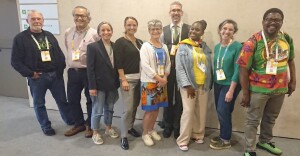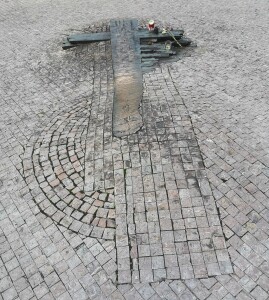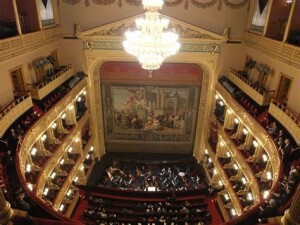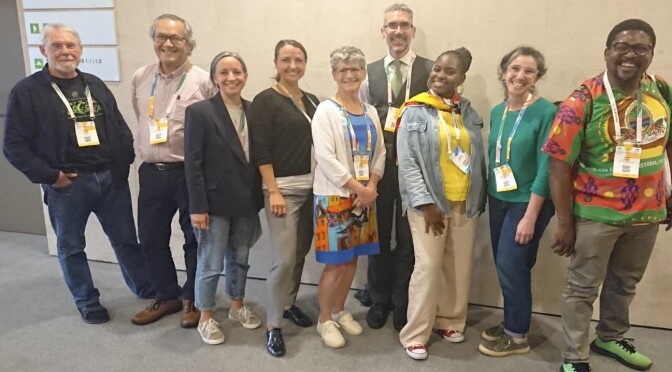Morien Rees
Vardø museum, rådgiver museumsutvikling
The train on Platform 11 at Oslo Central Station departed on time for Gothenburg, the first stage of my journey to ICOM’s General conference in Prague. Continuing onward via Copenhagen, Hamburg and Berlin I arrived late the following evening as the skies opened over Prague in one of the most astonishing rainstorms I have ever experienced. Between leaving the train and reaching the concourse below, rainwater was pouring down the steps from the platform into the ticket hall – a salutary reminder of the challenging times we are now living through, and the most important themes on the agenda for the 2022 triennial – sustainability and climate breakdown.
Already at the hybrid symposium in Prague in September 2021, ICOM’s Working Group on Sustainability (WGS) raised the possibility of encouraging European members to travel by train to the following year’s general conference. The aim to reduce the conference’ carbon footprint. And while ICOM and the Prague organisers are to be commended in taking a series of measures to reduce the conference footprint – including offering the global membership the first ever hybrid conference, nonetheless, the great majority of delegates, reflecting the viewpoint of society at large, chose to travel to Prague by plane.
As a member of the WGS, I travelled to Prague very much looking forward to the conference in the knowledge that sustainability and the climate emergency had become central issues for the global museum sector since the previous conference in Kyoto in 2019 – both within and outside of ICOM. It was at Kyoto that sustainability first appeared on the ICOM agenda, resulting in the resolution “On sustainability and implementing Agenda 2030” being endorsed. At the general conference in Prague the WGS was expecting confirmation of a momentum shift. In addition to a keynote presentation from Hilda Flavia Nakabuye, the inspiring founder of Fridays for Future in Uganda, the programme included a plenum round table on sustainability, while the WGS itself had been given two sessions by the organisers.
At the first, Henry Mcghie and Caitlin Southwick, both important figures in the sustainability debates in the museum sector today through their respective consultancies, Curating Tomorrow and KI Futures, presented the ICOM’s draft sustainability action plan. It can be accessed on the ICOM members space here: https://icom.museum/en/member/working-group-on-sustainability-towards-a-2030-action-plan-for-icom/ where the WGS invites feedback on the plan.
The second session, in the form of a panel debate on climate activism, included presentations from Brazil and Chile, Uganda, the UK, Italy and the USA. It ended in an electric question and answer session notable for the contribution of Stefan Simon, Heritage scientist and Director of the Rathgen Research Laboratory in Berlin. HIs grave concerns about whether German museums will be able to accommodate the energy crises this winter were endorsed by many in the audience. He viewed it as a forewarning of the challenges facing all museums in the near future as the climate emergency and biodiversity loss reach, and pass tipping points. There was no doubting the consensus amongst those present that meeting these challenges must be given the highest priority within ICOM.

Both the WGS sessions were well attended and enthusiastically embraced by ICOm members young and old. Moreover, the level of discussion on sustainability issues and climate breakdown in the corridors and committee meetings was equally encouraging for the future. CAMOC exemplified ICOM members’ awareness of the urgency of addressing sustainability challenges by organising two joint sessions entitled Museums, Citizens and Urban Sustainability, and devoted its own off site meeting to a programme that shared sustainability experiences and projects from all the regions of the world at the beautiful Cténice Chateau Complex a part of the Prague City Museum.
The fast-growing interest in sustainability within ICOM and the museum sector, was further confirmed at the Prague triennial in discussions with the leaders of the processes of DEFINE, the ICOM Strategic Plan for 2022- 2028, and the revision of the ICOM Code of Ethics. Each reported that during their consultation processes ICOM’s members placed sustainability as one of the core issues that museums must address. The WGS ends its second mandate period in December. During its meeting in Prague the Executive Board accepted the WGS proposal that it should be replaced by an International Committee on Sustainability. An International Committee will offer ICOM members a much greater opportunity to contribute to sustainability initiatives within the organisation, and through awareness building, to activate our institutions and public. For those who might be interested in contributing to this transition, more information is available in the ICOM members space or by contacting the WGS, either Katharine Turvey at ICOM’s secretariat katharine.turvey@icom.museum or morien.rees@varangermuseum.no.
The presentation of the new museum definition and its endorsement by over 94 percent of the voting members was the highpoint of the conference. The co-chairs of the process, Lauren Bonilla Merchav and Bruno Brulon were given a standing ovation for the work that they have done; and the organisational structure of the process, including four consultation stages, was highly, and rightly, praised. The new definition, with its inclusion of sustainability, diversity and community resonates with the WGS’ draft Action Plan and offers the ICOM global family a blueprint for addressing the challenges that the sector, and our public, is facing. Moreover, as can be seen in the table below, provided by Henry Mcghie, the definition can be directly linked to eleven of Agenda 2030’s sustainability goals and, through their holistic nature, linked to the remaining six.
| Statement from the new Museum Definition | Closely related SDG targets |
| A museum is a not-for-profit, permanent institution in the service of society | 9.1 (sustainable infrastructures), 16.10 (protect human rights), 16.B (enforce laws and policies for sustainable development) |
| that researches, collects, conserves, interprets and exhibits tangible and intangible heritage. | 9.5 (researches), 11.4 (collects and conserves, interprets and exhibits), 4.7 (interprets and exhibits) (note that the topics that museums are concerned with can contribute to all 17 SDGs) |
| Open to the public, accessible and inclusive, museums foster diversity and sustainability. | 1.4 (equal access to services and to property, including cultural heritage), 4.5 (equal access to education), 4.7 (Education for Sustainable Development), 4.A (safe and inclusive learning environments), 10.2 (universal inclusion), 11.7 (welcoming public spaces), 12.8 (information for sustainable development and lifestyles in harmony with nature), 13.3 (education for climate action), 16.B (enforce laws and policies for sustainable development) |
| They operate and communicate ethically, professionally and with the participation of communities, | 4.4 (staff skills), 8.5 (fair pay and decent work), 8.8 (workers’ rights, decent work, workers’ safety), 10.3 (equal opportunities), 12.6 (sustainable practices), 16.6 (effective, accountable and transparent institutions), 16.7 (inclusive decision making), 16.10 (protect fundamental rights), 16.B (enforce laws and policies for sustainable development), 17.14 (policy coherence for SD), 17.16 (international partnerships), 17.17 (local and national partnerships) |
| Offering varied experiences for education, enjoyment, reflection and knowledge sharing | 3.4 (promote health and wellbeing), 4.7 (Education for Sustainable Development), 9.5 (research), 11.7 (welcoming public spaces), 12.8 (information for SD and lifestyles in harmony with nature), 13.3 (climate action) |
Two other initiatives presented at Prague exemplify the paradigm shift that ICOM has undergone in recent years regarding Agenda 2030 and climate breakdown: the ICOM Strategic Plan 2022 – 2028 and the ongoing revision of the Ethical Code. The former, although perhaps still needing some polishing to align it with the UN’s Agenda 2030, was given a solid endorsement by the membership; work on embracing Agenda 2030 in the revision of the latter will continue under Sally Yerkovich, the leader of ETHCOM. The next consultation ending in October 2022.
The WGS were also partners in the H.E.L.P. (Heritage Education, New Formats and Free Licences opportunities for Dissemination, Co -Creation and Open Data) project during the pandemic, and contributed a paper to a session hosted by the national committees of the Czech Republic, Portugal and Italy. H.E.L.P. was a response to how the pandemic encouraged museums to create innovative, participatory and inclusive ways to involve visitors online. Its aim, to guide museums through a self-assessment process and to support them in the realization of digital projects for heritage educations, based on open licences and sustainable practices. In the era of global content sharing museums are perhaps not sufficiently aware of the extraordinary opportunities in terms of culturaø, social and economic development that derivie freom the adoption of open licence. H.E.L.P. has created a Massive Open Online Course (MOOC) of 15 video lectures to help improve open access approach and participatory opportunities. More can be found here: https://www.youtube.com/playlist?list=PLflzf3DjodxbTirJ3mmhcpKy0yCtxtjR3
On a more personal note, during the conference delegates were reminded that the 21st of August was the 54th anniversary of the Warsaw pact’s invasion of the then Czechoslovakia in 1968. The parallel with Russia’s invasion of Ukraine was manifest. It afforded ICOM delegates the opportunity to express their solidarity with our colleagues, their families, indeed all Ukrainians. For those of us who were young and active in the summer of 1968, Jan Palach is a name never to be forgotten and a visit to the memorial site of his self-immolation in protest against the invasion outside the main entrance to the National Museum was mandatory.
Later I visited the Museum of Decorative Arts opposite nám J.Palacha, the square bearing his name. After viewing of the collections, I came across a book by the great Czech photographer Josef Koudleka, who came to prominence through the photographs captured that day. His account, well worth reading, is here: https://www.magnumphotos.com/newsroom/josef-koudelka-invasion-prague-68/

Prague is a city that has had an important role in European cultural for many hundred years, and the organisers of the General Conference had created a cultural programme that offered the delegates time and opportunity to wander down through these centuries. Whether it was a vist to one of Prague’s many museums; a late evening stroll over the famous 13th century Karlov most, the bridge over the River Vltava connecting Prague’s Old Town and the modern city centre complete with street artists and entertainers, or a walk around the Old Jewish quarter – particularly evocative for those who had read Gustav Meyrink’s novel The Golem, the sense of history was palpable. As a final validation of Prague’s place at the cultural heart of Europe, the organisers had obtained tickets for a performance of Mozart’s Don Giovanni at the Estates Theatre. It opened in 1783 and is acknowledged as one of the most beautiful historic theatre buildings in Europe. In 1787 Mozart himself conducted the world premiere of Don Giovanni. I was one of the lucky ones who was able enjoy this unique experience.

The 2022 general conference will be remembered for the cultural programme, but more hopefully it will be remembered as a watershed for the organisation with regard to addressing the UN’s Agenda 2030 and the challenges of the climate breakdown. The 2025 conference will take place in Dubai in the United Arab Emirates. It is to be hoped that the momentum for change, begun in Kyoto, ratified in Prague will continue undiminished, and that our colleagues in the UAE, and around the globe, will fully embrace the imperative at the heart of the United Nation’s call to Transform our World.

